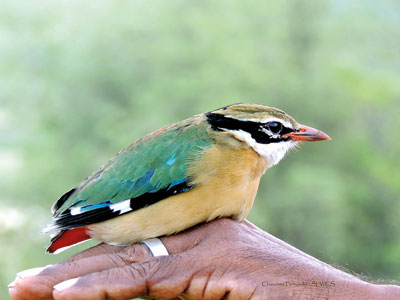News
If you see a fallen feathered friend, show a little kindness
It’s the migratory season for our feathered friends and the public are urged once again to show a little kindness to these winter visitors who are exhausted after their long migratory flight.

Indian Pitta found in Wasgamuwa on October 25. Pic courtesy Chandima Fernando
During the past few days many exhausted Indian Pittas (avichchiya in Sinhala) have been sighted in various parts of the country. In their exhausted state these birds could become easy prey to crows and domesticated cats and dogs. Almost half of the bird species found in Sri Lanka are migratory. They begin to arrive here from end August and stay on until March, April. The Indian Pitta and a few other migratory birds come here towards the end of October and early November. It is a well recorded fact that the Indian Pitta who is disoriented after its long flight hits window panes.
Addressing a group of bird enthusiasts on October 8, the Department of Wildlife Conservation’s (DWC) veterinary surgeon Dr.Suhada Jayawardana said the public could give a few first aid steps if they encounter these birds in distress. “Invariably the migrant bird would be dehydrated. A hydration solution such as Jeewanie or simply water can be given to the bird. Soak a piece of cotton wool with the rehydration solution and drip it on to the beak,” Dr. Jayawardana instructed. However he cautioned not to give water if the bird was unconscious or showed signs of a fit.
In most cases he said the birds recover on their own within a few hours. So the first step is to judge whether there is a need for human intervention as attempts to catch the bird may do more harm to it. On some occasions it would suffice to provide a safe area away from common predators for the bird to recover on its own and placed in a closed cardboard box with holes providing ventilation. If you suspect any fractures or other issues call the DWC and handover the bird for further treatment, Dr.Jayawardana said.
The Field Ornithology Group of Sri Lanka (FOGSL) annually organises the MigrantWatch programme to guide the public on what to do if they encounter an exhausted migrant bird. The group can be contacted on 0112501332/ 0718440144. The FOGSL also requests the public to inform them of such encounters along with a photograph of the bird if possible to migrantwatch.srilanka@gmail.com.

